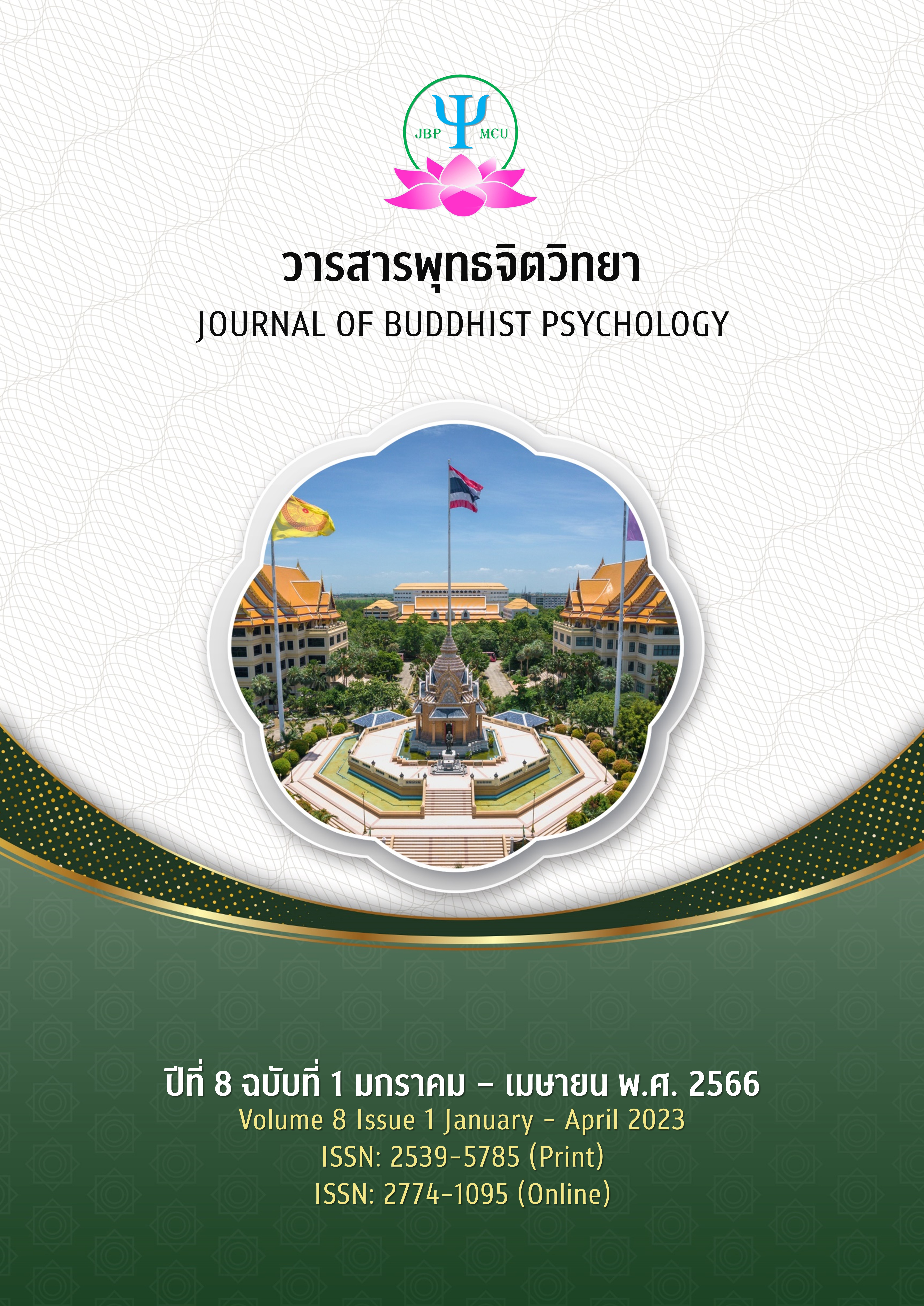ความสอดคล้องของพฤติกรรมมนุษย์ตามแนวทฤษฎีผู้นำสัตว์ 4 ทิศ กับจริต 6 ในทางพระพุทธศาสนา
Main Article Content
บทคัดย่อ
บทความวิชาการฉบับนี้คณะผู้เขียนมุ่งศึกษาความสอดคล้องของพฤติกรรมมนุษย์ตามแนวคิดทฤษฎีผู้นำสัตว์ 4 ทิศ ได้แก่ กระทิง หนู อินทรีย์และหมี กับความประพฤติตามหลักจริต 6 ในทางพระพุทธศาสนา ได้แก่ ราคจริต (รักสนุก ติดเพลิดเพลิน) โทสจริต (หงุดหงิด โกรธเคือง) โมหจริต (ลุ่มหลง มัวเมา) สัทธาจริต (ศรัทธา เลื่อมใส) พุทธิจริต (ปัญญา ความรู้) และวิตกจริต (กังวล ฟุ้งซ่าน) โดยจัดประเภทพฤติกรรมมนุษย์ตามแต่ละลักษณะนิสัยที่ตรงกันส่วนใหญ่ซึ่งพบว่า กระทิงมีนิสัยสอดคล้องกับโทสจริต อินทรีย์มีนิสัยสอดคล้องกับพุทธิจริตผสมกับวิตกจริต หนูมีนิสัยสอดคล้องกับราคจริตกผสมกับโมหจริตและหมีมีนิสัยสอดคล้องกับสัทธาจริต ซึ่งผู้เขียนหวังเป็นอย่างยิ่งว่า บทความวิชาการนี้จะเป็นประโยชน์เพื่อใช้เป็นกรอบทำเข้าใจพฤติกรรมและลักษณะนิสัยของมนุษย์ได้เป็นอย่างดี รวมถึงทราบแนวทางการพัฒนามนุษย์ตามลักษณะที่ต่างกัน ซึ่งจะเป็นประโยชน์ต่อการพัฒนาทรัพยากรมนุษย์ให้เหมาะสมส่งผลให้เกิดความงอกงามด้านบุคลิกภาพส่วนบุคคลต่อไป
Article Details

อนุญาตภายใต้เงื่อนไข Creative Commons Attribution-NonCommercial-NoDerivatives 4.0 International License.
เอกสารอ้างอิง
Candiko, P. N. (2018). Characteristic behaviour modification for life development: Process and Practices. Panidhana Journal, 14(1), 55-84.
Dhammakamo, P. T. (2019). Carita 6 of science in human mind reading by Anusorn Jantapan, Ph.D.,Boonchai Kosolthanakul, Ph.D.. Journal of graduate studies review of Nakhonsawan Buddhist College, 7(2), 227-238.
Division of Mental Health Promotion and Development. (2019).Teenage Creative Handbook of Strong Together. Nonthaburi: Beyond Publishing.
Eua-arporn, V. (2019). How to Communicate for getting both Work and Man. TPK news No. 270, 15-16 Retrieved April 20, 2022, from https://www.tpa.or.th/tpanews/upload/ mag_content/148/ ContentFile2957.pdf
Kaveetanakul, S., Srikhruedong, S., and Titichoatrattana, W. (2020). Development of mental transformation model following Buddhist psychology classified by temperament types. Journal of MCU Humanities Review, 6(1), 71-84.
Iamkrasin, S. & Maneewattana, C. (2022). Application of the DISC Theory for Analyzing Character Development: A Case Study of Henrik Ibsen’s A Doll’s House. HMA's 40th Anniversary National and International Conference, 426-445.Retrieved April 20, 2022, from https://www.academia.edu/45029941/การประยุกต์ใช้ทฤษฎีผู้นํา 4 ทิศ เพื่อวิเคราะห์ พัฒนาการของตัวละคร กรณีศึกษา บ้านต๊กตาของเฮนริค อิบเซ
Kowittaya, M. (2017). Take a Peek at a Classroom Corner: The use of Celtic Wheel for the Learner’s Self-understanding. Journal of Education Studies, 45(1), 349-353.
Linphoo, M. (2020). Model of group counseling based on satipatthan in promoting the prisoners’ Buddhist intellectual well-being (Doctoral thesis). Srinakharinwirot University.
Linphoo, M., Phrayai, N., Prasertsin, U. & Jinngee, P. (2020). the drug cased prisoners’ intellectual well-being and habit based on Buddhist principles. Journal of Social Science and Buddhistic Anthropology, 5(3), 263-277.
Mini, F. (2015). Need DISC Theory. CINDE Journal, 36(3), 27-29.
Ngamkajornkulakit, W. (2019). The Understanding and the Access of Digital aged Learners with DISC Model. Retrieved April 20, 2022, from http://dspace.spu.ac.th/bitstream/12345 6789/6488/1 /บทความTLC_ผศ.วรรณี%20งามขจรกุลกิจ%20.pdf
Palibhatrangkur, K. (2018). Cariyam 6: Scope in the human understanding. Executive Journal of Arts, Faculty of Humanities: Bangkok University. Retrieved April 20, 2022, from https://www.bu.ac.th/knowledgecenter/executive_journal/july_sep_06/pdf/Executive%20Journal_F13_68-72.pdf
Pannsamilinkara & Gaur, J. (2021). Carita (Temperament) in Theravada Buddhism. Journal of Emerging Technologies and Innovative Research (JETIR), 8(1), 775-783.
Payutto, P.A. (2016). Dictionary of Buddhism. 34th Edition, foundation of peace studies.
Wipatchawatee, S., Buarabha, H. & Kamdee, K. (2017). Buddhist Philosophy on Personality Development. Journal of graduate studies review, 13(3), 134-143.


